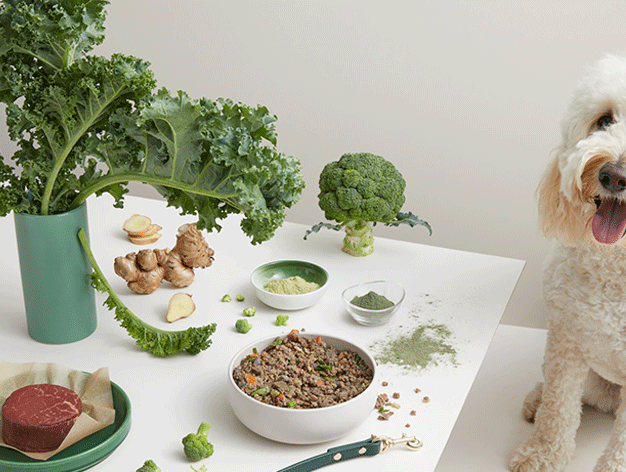Thinking of getting a dog? Here’s the basics of puppy nutrition 🐶
There’s nothing like the excitement of bringing a new puppy home for the first time – so much to discover and so much to love! If you’ve never had a pup before, you’ll find they don’t stay small for long. They grow fast, and this means you’ll need to be feeding your puppy special nutrition from the start to ensure they get all the nutrients required for healthy growth and development.
When do puppies become adult dogs?
While some breeds can be sexually mature (and therefore able to have puppies) at just six months, becoming a fully developed adult dog takes longer. It does depend on the breed, with smaller breeds reaching full size within 12 months or so, and large breeds taking longer – anything up to 24 months.
Why is your puppy’s nutrition important?
During their first months of life, your puppy’s body is going through many changes, so their food is extremely important in setting them up for their future health. Puppies have different nutritional requirements than adult dogs in many areas, so it’s important to make sure that they’re getting everything they need to grow.
Balanced nutrition that’s tailored to the special growth and development that happens during puppyhood ensures that your puppy grows at the right rate and receives the extra nutrients and energy they need for healthy development and to stay alert and active. It’s key to their future health!
Quality and quantity count
The quality of your puppy’s nutrition shows in the health of your pup. It directly influences their immune system, their body composition and their ability to grow into strong, healthy adults.
Feeding puppies the right quantity of food is also important, as it helps ensure an optimal growth rate – slow and steady growth allows puppies to reach their ideal adult body size and condition, while avoiding excessive weight gain.
One thing’s certain – A good diet at this key stage of life will give your dog a great start in living a full, healthy life.

So why does your puppy need special nutrition?
Bones and muscles are growing!
Protein builds muscles, and puppies need more than adults while they grow. Quality protein sources have high bioavailability, which means it’s easily absorbed and is ready for your pup to use it where it’s needed.
Calcium and phosphorus – Puppies need more calcium and phosphorus than for adults to meet the demands of their growing bones, however the balance of these two important minerals, as well as overall calorie intake is really important. That’s because rapid growth can stress developing bones and joints, which can result in skeletal issues such as developmental orthopedic disease (DOD), hip dysplasia and another bone and joint disorder called OCD (osteochondritis dissecans).
To ensure healthy skeletal development, health and tailored dog foods like Lyka meals keep the calcium: phosphorus ratio at a lower level that allows you to give your dog a bone now and then – if your vet approves.
Lysine: arginine ratio – these are essential amino acids for dogs, however studies have shown that when the ratio is too high, it can actually shown to decrease the chance of developing certain immune diseases (such as canine atopic dermatitis) – a key reason may be due to the fact that less processed food leads to increased microbiome diversity – that’s the mix of all the millions of microorganisms that live in the gut and that help keep your dog healthy.
Their brain is still growing and developing
DHA (docosahexaenoic acid) is an omega 3 fatty acid that plays a vital role in brain and retinal development. DHA is found in fish (Lyka pet foods use sardines and mackerel in their meals), and studies show that puppies with high-DHA diets had significant brain, retina and immunity benefits.
Puppies can be picky eaters!
Just like kids, introducing a variety of foods, tastes and textures early in life helps avoid fussiness later in life. If you’re moving your puppy onto healthy dog food meals (such as Lyka pet foods), it’s important to transition slowly, so it doesn’t upset their little tummy – especially if they’re currently eating kibble. Your puppy may want to gobble and go, but they’ve gotta take it slow!
How much should you feed your growing puppy?
Serving sizes need to change while your puppy grows. It’s generally recommended to start on a smaller pouch and gradually increase servings as your puppy hits certain weight milestones. And if you start with Lyka pet foods, they’ll send you a Meal Planner email during your first week / box to let you know these expected milestones – once your puppy reaches them, you simply let them know and they’ll update their servings for you.
Servings are customisable so you can always adjust up (or down) depending on your dog’s energy and growth needs.
Start your puppy with the best dog food available with Lyka pet foods
60+Club have partnered with Lyka and are offering readers 20% off your first box
Lyka pet foods use high-quality protein in their recipes, using only free-range chicken and eggs and grass-fed beef and lamb – Lyka’s recipes have all been designed by in-house vet Dr Matthew Muir.
This article was first posted by Lyka pet food with the permission of Lyka pet food. Read article here.






